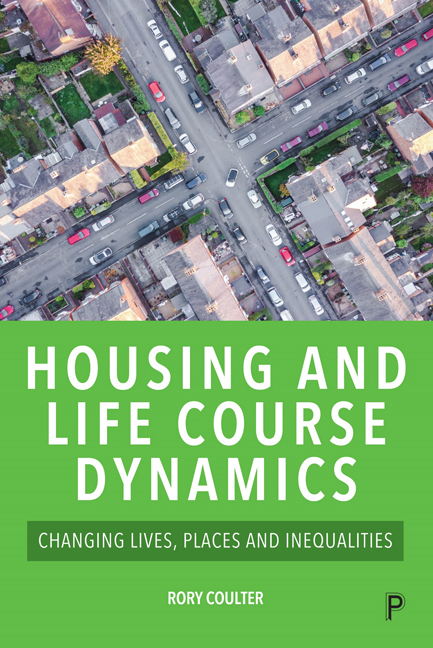Book contents
- Frontmatter
- Dedication
- Contents
- List of figures and tables
- List of abbreviations
- Notes on the author
- Acknowledgements
- Preface
- 1 Introduction
- 2 Housing: a life course perspective
- 3 Households and families
- 4 Learning and training
- 5 Employment and money
- 6 Health, well-being and care
- 7 Changing places
- 8 Understanding housing and life course dynamics
- Notes
- References
- Index
Preface
Published online by Cambridge University Press: 18 January 2024
- Frontmatter
- Dedication
- Contents
- List of figures and tables
- List of abbreviations
- Notes on the author
- Acknowledgements
- Preface
- 1 Introduction
- 2 Housing: a life course perspective
- 3 Households and families
- 4 Learning and training
- 5 Employment and money
- 6 Health, well-being and care
- 7 Changing places
- 8 Understanding housing and life course dynamics
- Notes
- References
- Index
Summary
Take a moment to conjure up some of your earliest childhood memories. Now spend a little time running through the whole sweep of your life in your mind's eye. Finally, try visualising what sort of life you expect, or hope, to be living a few years hence.
The chances are that while doing this, your mind has touched on images relating to what this book refers to as your housing career: in essence the succession of households, dwellings and places that each of us lives in through time. You may even have thought about how aspects of your housing career have related to things going on elsewhere in your life, such as your work or your relationships with others. This simple and highly personal exercise thus reminds us that housing is integral to the course of our lives and so people need to be placed centre-stage in both research and debates about housing issues. Yet frequently this is not the case as markets and government policies tend to dominate much of the intellectual and public conversation about the housing problems that today afflict much of the Global North.
This book aims to bring the dynamics of people's lives to the heart of how we think, study and talk about housing. It does this by exploring how who we are matters for our housing and how housing helps make us into who we are. The book develops a modern life course framework to explore how residential decisions are made, how housing shapes lives, and how these processes interact with changes in local populations and in the broader structure of societies. A core argument is that housing in the 21st century both reflects and helps amplify inequalities, not only of wealth and prosperity, but also across health, employment, education and in family life.
The catalyst for writing this book was my growing dissatisfaction with existing work on housing and the life course. These frustrations are neither about the quantity of research (there is an awful lot of it!) nor its quality. Rather, my main concern – exposed time and again while teaching – is that work in this area is far too fragmented. In one sense this is understandable. Not only is housing an interdisciplinary topic, but the competitive institutional pressures of today's universities strongly incentivise the rapid-fire production of short research papers.
- Type
- Chapter
- Information
- Housing and Life Course DynamicsChanging Lives, Places and Inequalities, pp. xi - xiiPublisher: Bristol University PressPrint publication year: 2023

